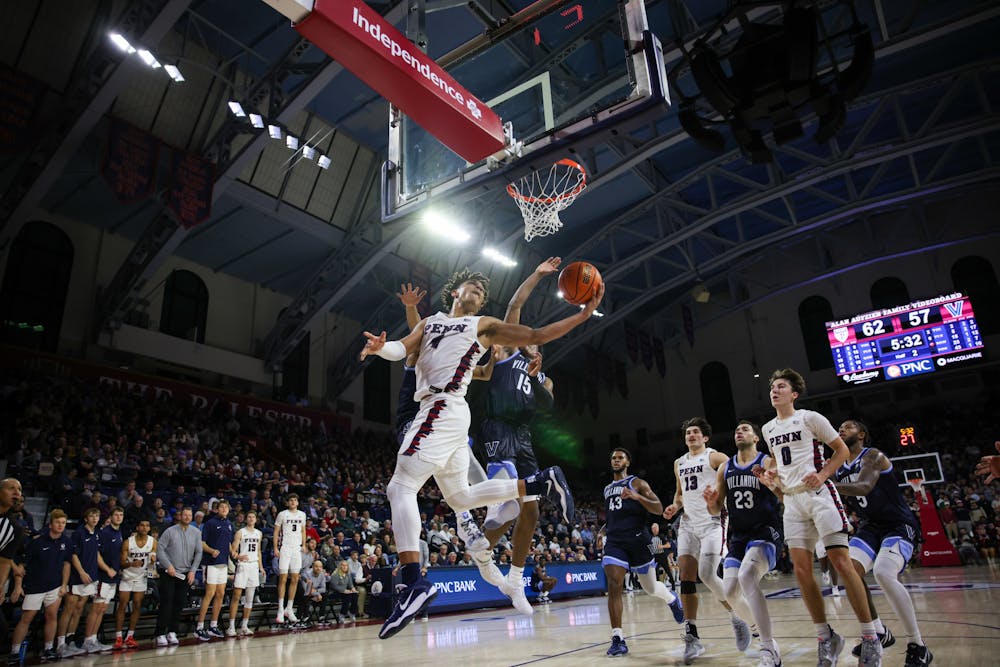
When students and streamers poured down onto the court of the historic Palestra on Monday night, it signaled a moment in time for Penn men’s basketball. The Quakers had defeated nationally-ranked rival No. 21 Villanova for the first time since 2018, earning a much-deserved victory after an offseason of turmoil.
But for the conference the Quakers call home, the upset was far from an isolated moment. Rather, it marked another chapter in a series of outcomes that have bolstered the reputation of the Ivy League, and given rise to a new consideration of what the conference can be in the context of the greater men’s college basketball world.
The most significant endorsement for the quality of the Ancient Eight came last March, when Princeton danced all the way to the Sweet Sixteen of the NCAA Tournament, upsetting Power Six programs like Arizona and Missouri along the way. It was then that the college basketball world first began to take notice of the long-dismissed Ivy League — to consider that just because players have homework to do off the court does not make them any less effective on it.
The dismissal of the Ivy is not without cause. It has been some time since the Ancient Eight has been a true player in Division I men’s basketball. Before the Tigers, the last Ivy League team to win multiple games in the same tournament was Cornell in 2010. Before that, it was Penn in 1979.
But over the past few seasons, a shift has been noticeable. While Princeton’s run may be the clearest example of March Madness success, the Ivy League as a whole has shown it is no David to the Power Six’s Goliath. The most recent example came in this year’s season-opener, when the Tigers soundly defeated Rutgers, a member of the Big Ten.
But the Scarlet Knights are not alone. Since 2022, the Ivy League has earned seven wins over Power Six schools and brought many other games down to the wire. The Ancient Eight has also proven its mettle in terms of talent. Of last season’s five All-Ivy first team selections, one spent the summer playing in the NBA G League (Tosan Evbuomwan), while two transferred to a Power Six program (Jordan Dingle, Chris Ledlum.)
All this to say that the emergence of the Ivy League has been a gradual build, not a momentary explosion. In defeating Villanova, a program that has claimed two of the last seven national championships, Penn proved two things. First, the Tigers are not an Ancient Eight outlier when it comes to their ability to compete with college basketball’s heavyweights. Second, the conference’s rise to national relevance is just beginning.
Last season during March Madness, Princeton coach Mitch Henderson dismissed the idea that teams would underestimate the Tigers because of their conference standing: “I think we’re probably beyond that now. We’ve done enough,” he said. Prior to the start of this season, Penn coach Steve Donahue remarked on the state of the Ancient Eight among the hierarchy of college hoops, saying “I think the Ivies have an incredible product. We’re the 12th-best league in the country.”
In the months and games since, both coaches have been proven correct in their endorsement of the conference. After finding such sustained success against big-time programs, the days of opponents glossing over the Ivy League games on their schedule are over. As Henderson once put it, “At this point, I don’t think you sneak up.”
In sports, respect is a fleeting gift. Penn will be the darling of the college basketball world only as long as it takes for another unlikely upset to yank the attention away. In that way, the Ancient Eight’s fight for recognition is still a work in progress.
But with more big matchups on the calendar, including a faceoff with Kentucky at the Wells Fargo Center on Dec. 9, the Red and Blue will have plenty more opportunities to prove that the Ivy League is more than an outsider — it is a league that belongs.
WALKER CARNATHAN is a sophomore and current deputy sports editor studying English from Harrisburg, Pa. All comments should be directed to dpsports@thedp.com.
The Daily Pennsylvanian is an independent, student-run newspaper. Please consider making a donation to support the coverage that shapes the University. Your generosity ensures a future of strong journalism at Penn.
Donate




